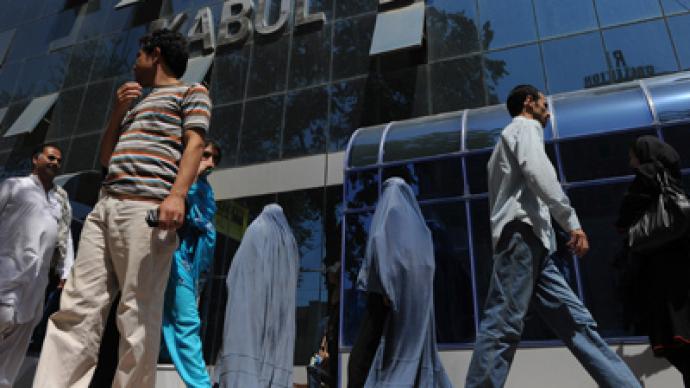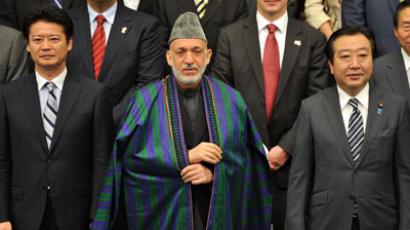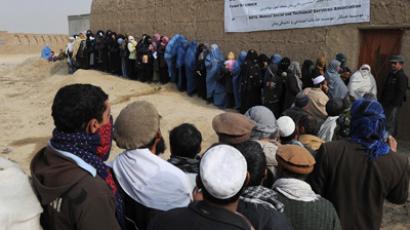Afghan politicians complicit in ‘Ponzi’ Kabul Bank - report

Political cronyism has hampered an investigation into the collapse of Afghanistan’s biggest bank, Kabul Bank, according to a confidential forensic audit, seen by AP. The 87-page report describes the bank as “a well-connected Ponzi scheme.”
The report allegedly describes the Kabul Bank scandal as involving money grabbing, weak banking oversight, lax prosecution, nepotism and fraud. The bank, licensed in 2004, grew to become Afghanistan’s largest financial institution and its subsequent collapse and bailout represents more than 5 per cent of total Afghan GDP.But based on recent allegations it’s said to have been run like a Ponzi scheme under nascent banking oversight. The list of ‘villains’ embroiled in the saga includes a poker playing bank chairman, an Afghan central bank head who fled to the US fearing for his life, the wealthy relatives of the Afghan president and vice president and the bank’s shareholders who brought up expensive properties in Dubai and splashed out cash on their friends and relatives.In total, hundreds of millions of dollars is said to have been sneaked out of Afghanistan, with some of it even in airplane food trays. The Independent Joint Anti-Corruption Monitoring and Evaluation Committee, which issued the report, claims a special judicial tribunal that has started hearing the case this month is involved in activities that are, “well outside the legal norms of criminal procedure.” The committee says the tribunal has held meetings with shareholders, accused individuals and potential witnesses. It has urged guilty parties to repay the money. As of 31st October 2012 receivers had recovered US$ 135.3 million in cash and assets worth US$ 181.1 million. The chairman of the committee, Drago Kos, told reporters at a news conference in Kabul that officials had had to defer “questions to political parties” and that they had seen “some cases of direct political influence from above.” Although they found no evidence that President Karzai was meddling in the case, the audit does state that after Karzai set up his own commission to look into the scandal, those running it then announced that “the president will decide who to prosecute based on its recommendation.”The Evaluation Committee also pointed a finger at the attorney general’s office for not carrying out a substantial investigation into the bank until April 2011, 8 months after jittery customers began withdrawing deposits from the crisis hit bank and 5 months after the Afghan central bank asked the attorney general to start a criminal investigation.Although the attorney general began preparing documents in May 2011, the indictment was not issued until a year later. The charges in the indictment range from money laundering, misuse of authority, opening accounts under pseudonyms and using counterfeit documents. More than 20 bank executives, as well as bank employers and workers at the central bank have been named as benefitting from the fraud. But the Afghan indictment did not name many of the guilty parties, including accounting firms who created false documents, airline employers who helped smuggle cash out of the country and shareholders who received loans at zero interest who had no intention of repaying them.The confidential audit describes Kabul Bank as a sophisticated outfit, with one set of books for the regulators and another one that showed how those in charge were fattening their wallets. The report describes how the bank used more than 100 corporate stamps for fake companies to make documents look like the real thing and operated some of its branches without even having a government permit to do so. But despite recent allegations, many of those involved are still at liberty and in possession of their illegally gained wealth. “The major factor impeding the criminal investigation process is political interference resulting in reluctance to pursue charges against some of the participants of the Kabul Bank fraud,” the report states. The attorney general’s office in Kabul vehemently denied that there had been political meddling, “We strongly reject any comments that the attorney general’s office dealt with this case in as a political issue.” The Afghan central bank has tried to carry out various examinations of Kabul Bank, but many have accused it of failing to operate independently or stand up to political interference, let alone hold those responsible accountable. Whatever the final outcome of the saga, the report’s findings have for some reinforced the view of Afghanistan as a deeply corrupt and broken country, potentially impacting further financial transactions with Western institutions.














